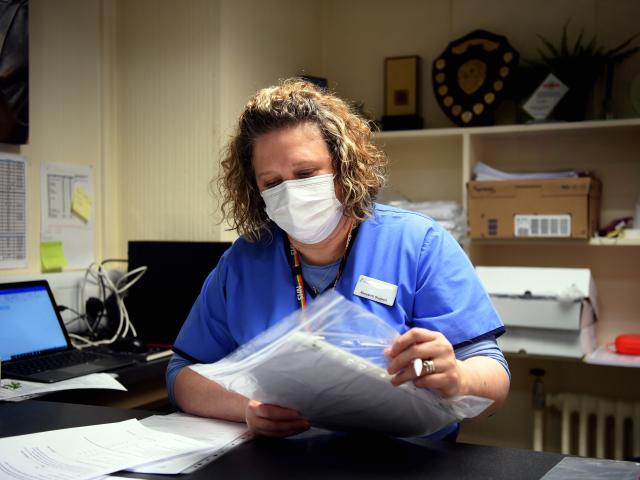
A year of impact - The Wales COVID-19 Evidence Centre
22 March
The first research centre of its kind in Wales which provides evidence to help ministers make critical decisions during the pandemic, will mark its first anniversary this week.
Analysing essential evidence
The £3m Wales COVID-19 Evidence Centre was established by the Welsh Government in March 2021 to analyse crucial scientific research to help tackle some of the emerging health and social care challenges created by COVID-19.
The Centre provides rapid reviews of key international research findings as well as focused research studies to guide decision-making by ministers, and leaders in the NHS and social care sectors.
Its work will be showcased at an event attended by the First Minister Mark Drakeford Judith Paget, NHS Wales Chief Executive and Director General for Health and Social Services.
Making an impact
In the last 12 months the Centre has completed 25 reviews compiling research on topics such as vaccine uptake in disadvantaged communities, the mental health impact on key workers, and the effectiveness of face masks, a significant review which underpinned the Welsh Government’s advice to keep face coverings on public transport, in shops and in health and social care settings.
The Centre’s review of disinfectants and ventilation in schools led to targeting of resources towards carbon dioxide monitors to assess the effectiveness of ventilation and these are now a key part of day-to-day protection in schools.
Most recently the Centre provided the evidence about vaccine safety during pregnancy to support Public Health Wales in its campaign to encourage pregnant women to have the vaccine after it was revealed that vaccine uptake in pregnant women was low, contributing to increased hospital admissions.
The Centre is led by GP and Cardiff University academic, Professor Adrian Edwards whose core team works closely with collaborating partners such as Health Technology Wales, Wales Centre for Evidence-Based Care, Specialist Unit for Review Evidence, SAIL Databank, Bangor Institute for Health & Medical Research/ Health and Care Economics Cymru, and the Public Health Wales Evidence Observatory.
Director of the Wales COVID-19 Evidence Centre, Professor Adrian Edwards
He said: “All of these issues matter greatly to us and we are really pleased to have been able to provide the best evidence available to support Welsh Government, Public Health Wales and others in good time to inform the decisions they make to manage them to help us all.
“Going forward we are looking at how government through research can help groups in society who may have been especially affected – women, disabled people, the LGBTQ+ community, people who are homeless or in prison, people with long COVID and ethnic minority staff in the NHS.
“Both for Long COVID and more generally we are also now starting a programme of new research studies. Building this directly on our evidence reviews is a major development of the Wales COVID-19 Evidence Centre for 2022, and will be a first for Wales among the COVID evidence centres around the world. I'm proud of the work of the team and the contribution we have made to address some of the serious challenges posed by the pandemic."
First Minister Professor Mark Drakeford
He said: “Scientific research and data are vital tools to enable us to make informed decisions about how we tackle some of the most challenging issues we face as a result of the pandemic. The Wales COVID-19 Evidence Centre has played a crucial role in providing the evidence to support decisions made by the Welsh Government and will continue to do so as we support our communities to tackle the far reaching impacts of COVID-19.”
Director of Health and Care Research Wales, Professor Kieran Walshe
He said: “The Wales COVID-19 Evidence Centre has focused on how COVID-19 has changed the health and care sector now and in the long term and it brings together the key research that helps us understand the pandemic now and for our future decisions in the recovery phase.
“Ending the pandemic relies fundamentally on research delivering solutions to diagnosis, treatment and prevention, and I am really grateful to Professor Edwards and his team for the work so far in addressing some of the far-reaching impacts of COVID-19.”